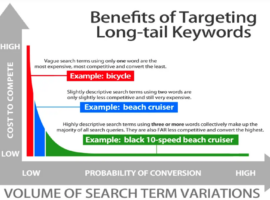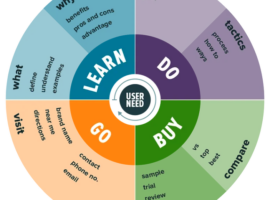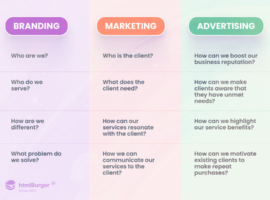SEO Basics: A Beginner’s Guide to Better Rankings
Related Questions Asked and Answered
- What are the basics of SEO? SEO basics include understanding keywords, optimizing content, and improving website structure to boost search engine rankings and organic traffic.
- Why is organic traffic important for my website? Organic traffic is crucial as it brings visitors to your website without paid advertising, building credibility and trust with your audience.
- How can beginners start optimizing their websites for search engines? Beginners can start by researching keywords, creating quality content, and improving their website’s structure and load speed.
- What are some simple SEO tips for better rankings? Simple tips include using relevant keywords, optimizing meta tags, creating mobile-friendly designs, and maintaining consistent content updates.
- What role does keyword research play in SEO? Keyword research helps identify terms your audience searches for, guiding your content strategy to match user intent and improve rankings.
Understanding SEO Basics
Search Engine Optimization (SEO) is the practice of optimizing your website to improve its visibility on search engine results pages (SERPs). At its core, SEO helps drive organic traffic to your website, allowing you to connect with people actively searching for products, services, or information you offer. Whether you’re a small business or a large enterprise, mastering SEO basics is essential for online success.
Why SEO Matters
 SEO is the foundation of your online presence. Without it, your website may remain invisible to potential customers. Here are key reasons why SEO is essential:
SEO is the foundation of your online presence. Without it, your website may remain invisible to potential customers. Here are key reasons why SEO is essential:
- Increases Organic Traffic: SEO attracts users genuinely interested in your offerings.
- Builds Credibility: High search rankings instill trust in your audience.
- Cost-Effective: Compared to paid ads, SEO is a sustainable long-term strategy.
- Improves User Experience: SEO ensures your website is user-friendly and informative.
To get started with SEO, understanding the role of keywords, website structure, and content optimization is crucial.
The Role of Keywords in Search Engine Rankings
Keywords are the building blocks of SEO. These are the terms users type into search engines to find information. For instance, someone looking for beginner SEO tips might search for “SEO basics.”
How to Choose the Right Keywords
- Brainstorm Topics: Think about your audience and the questions they might ask.
- Use Keyword Tools: Tools like Google Keyword Planner and SEMrush can help identify popular search terms. Google’s Starter Guide can be found here.
- Analyze Competitors: See what keywords competitors rank for and identify gaps.
- Focus on Long-Tail Keywords: These are specific phrases, like “beginner’s guide to SEO,” that often have less competition but high intent.
Once you have a list of keywords, integrate them naturally into your website’s content.
Creating Content for Organic Traffic
 Content is king in SEO. High-quality, relevant, and engaging content helps you rank better on search engines and keeps visitors on your site longer.
Content is king in SEO. High-quality, relevant, and engaging content helps you rank better on search engines and keeps visitors on your site longer.
Tips for Creating SEO-Friendly Content
- Understand Your Audience: Know their pain points, interests, and questions.
- Use Keywords Strategically: Place them in headings, subheadings, and naturally within the content.
- Provide Value: Share actionable insights, how-tos, and solutions.
- Include Visuals: Images, videos, and infographics enhance user experience.
Content Types That Drive Traffic
- Blog posts
- How-to guides
- Case studies
- Infographics
- Videos
For example, a blog post on “How Local Search Optimization Can Improve Small Business Sales” could target a specific audience and generate significant organic traffic.
Optimizing Your Website for Better Rankings
A well-optimized website enhances user experience and makes it easier for search engines to index your pages. Key areas to focus on include:
Technical SEO
- Site Speed: Ensure your site loads in under three seconds.
- Mobile-Friendly Design: Use responsive designs to cater to mobile users.
- Secure Connection: Install HTTPS for better security and trust.
- URL Structure: Use clean and descriptive URLs, e.g., /seo-basics-guide-rankings.
On-Page Optimization
- Optimize title tags and meta descriptions with keywords.
- Use header tags (H1, H2) to structure content.
- Add alt text to images to improve accessibility.
Building Backlinks to Improve Domain Authority
Backlinks, or inbound links from other websites, signal to search engines that your site is credible and valuable.
How to Earn Quality Backlinks
- Guest Posting: Contribute to reputable blogs in your niche.
- Create Link-Worthy Content: Publish original research, infographics, or in-depth guides.
- Reach Out: Ask industry partners to link to your site.
Measuring SEO Success
Tracking your progress helps refine your strategy. Key metrics to monitor include:
- Organic traffic
- Bounce rate
- Keyword rankings
- Domain authority
Use tools like Google Analytics and Ahrefs to gather insights.
Key Takeaways
- Understand the Basics: Learning about keywords, content, and website structure is the first step toward SEO success. For more insights, explore our SEO services.
- Focus on Keywords: Researching and using the right keywords can significantly improve your visibility. Learn how website development integrates SEO.
- Create Valuable Content: Content that answers questions and provides solutions attracts organic traffic. Discover how telling your story can engage audiences.
- Optimize Website Performance: Fast-loading, secure, and mobile-friendly sites rank better. Explore local search optimization for better performance.
- Track and Adapt: Use analytics to measure success and adjust strategies. Learn about conversion rate optimization for better ROI.










